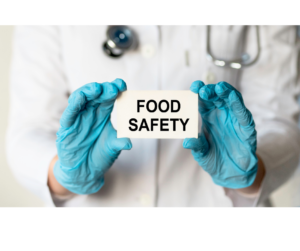In the complex world of food manufacturing, ensuring the highest standards of safety and quality is paramount. Achieving this goal requires a multifaceted approach, often involving various certifications and training programs. One such critical component is PCQI (Preventive Controls Qualified Individual) training, which plays a pivotal role in supporting and complementing several GFSI (Global Food Safety Initiative)-benchmarked certifications, including BRCGS, SQF, and Global G.A.P. Let’s explore how PCQI training aligns with these certifications to strengthen your company’s food safety practices.
PCQI Training: The Cornerstone of Food Safety Compliance
 PCQI training is designed to equip individuals with the knowledge and skills needed to develop, implement, and oversee a comprehensive food safety plan in accordance with FSMA’s Preventive Controls for Human Food Rule (PCHF). This standardized curriculum endorsed by the FDA serves as the foundation for achieving various GFSI-benchmarked certifications, demonstrating your commitment to science-based and effectively managed food safety practices.
PCQI training is designed to equip individuals with the knowledge and skills needed to develop, implement, and oversee a comprehensive food safety plan in accordance with FSMA’s Preventive Controls for Human Food Rule (PCHF). This standardized curriculum endorsed by the FDA serves as the foundation for achieving various GFSI-benchmarked certifications, demonstrating your commitment to science-based and effectively managed food safety practices.
BRCGS Certification: Elevating Food Safety Standards
BRCGS (British Retail Consortium Global Standards) certification is internationally recognized for its stringent requirements in food safety management. PCQI training seamlessly aligns with BRCGS by:
- Hazard Analysis and Preventive Controls: Both PCQI and BRCGS emphasize a risk-based approach to food safety, diving deep into hazard analysis and preventive controls.
- Documentation and Record Keeping: Proper documentation is a shared focus, serving as evidence that food safety systems are effective.
- Supplier Verification: BRCGS places high importance on supplier monitoring, a concept embedded in PCQI training.
- Training and Culture: Both emphasize fostering a proactive food safety culture.
- Continuous Improvement: PCQI-trained personnel possess the tools to drive continuous improvement, in line with BRCGS’s mandates.
Achieving BRCGS certification is facilitated by having PCQI-trained personnel, reducing duplication of efforts and ensuring global supplier understanding.
SQF Standard: Enhancing Quality Assurance
SQF (Safe Quality Foods) is one of the four major third-party food safety auditing standards, emphasizing robust food safety practices. PCQI training complements SQF by:
– Team Training and Gap Analysis: PCQI training aids in identifying gaps and responding to gap analysis in the food safety plan.
– Foundational Programs and Hazard Analysis: Both SQF and PCQI rely on foundational programs and hazard analysis.
– Risk Prioritization and Supply Chain Controls: PCQI-trained individuals can inform risk prioritization and enhance supply chain controls.
By attaining SQF certification alongside PCQI status, your organization gains a competitive edge, ensuring product quality and safety.
GLOBAL G.A.P. Standard: Nurturing Sustainable Agriculture
GLOBAL G.A.P. focuses on Good Agricultural Practices (G.A.P.) and has checklists aligned with FSMA’s PCHF Rule and Produce Safety Rule. PCQI training complements GLOBAL G.A.P. by:
– Compliance with Global Standards: PCQIs are trained to minimize contamination risks and document safety procedures, aligning with GLOBAL G.A.P.’s goals.
– Sustainable Agriculture: GLOBAL G.A.P. certification promotes sustainable farming practices, such as effective irrigation, integrated pest management, and soil conservation.
By following the four-step process for GLOBAL G.A.P. certification, your farm can enhance operational efficacy while meeting international standards for food production.
A Mutualistic Relationship
In a global food market where regional regulations and international standards intersect, the synergy between PCQI training and GFSI-benchmarked certifications is clear. Manufacturers and suppliers not only ensure compliance with regulations but also signal a commitment to producing safe, high-quality food products.
As food safety challenges evolve, so should the industry’s response. PCQI training, coupled with adherence to global standards like BRCGS, SQF, or GLOBAL G.A.P., equips organizations with the tools needed to safeguard the quality and safety of their products. In an era where consumers and partners demand transparency and accountability, these certifications and training programs strengthen your global brand image and food safety culture.
In conclusion, PCQI training stands as a cornerstone for achieving GFSI-benchmarked certifications, bolstering your organization’s ability to navigate the complex landscape of food safety and quality assurance.

